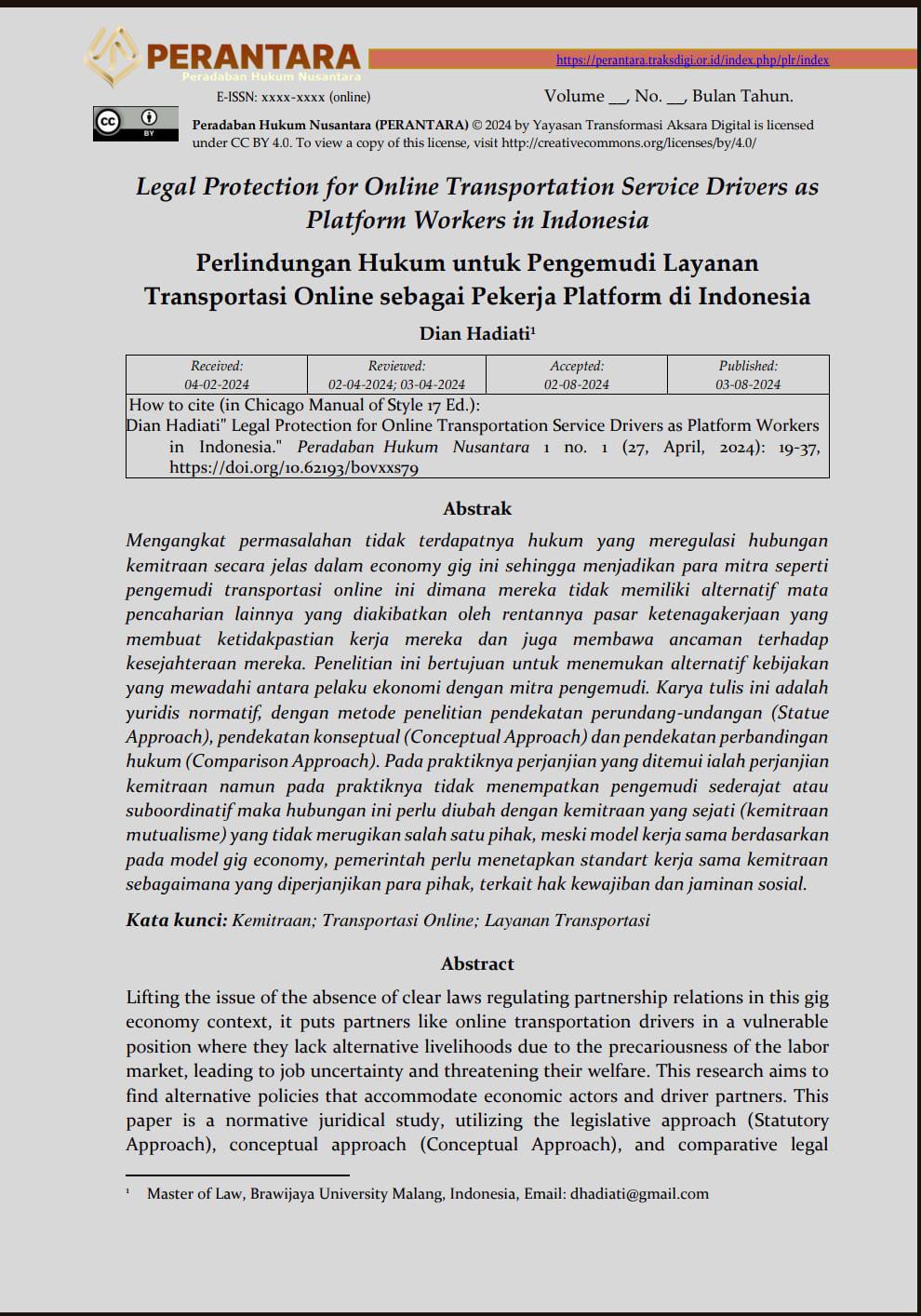Legal Protection for Online Transportation Service Drivers as Platform Workers in Indonesia
Perlindungan Hukum untuk Pengemudi Layanan Transportasi Online sebagai Pekerja Platform di Indonesia
DOI:
https://doi.org/10.62193/245kqc30Keywords:
Partnership, Online Transportation, Transportation ServicesAbstract
Lifting the issue of the absence of clear laws regulating partnership relations in this gig economy context, it puts partners like online transportation drivers in a vulnerable position where they lack alternative livelihoods due to the precariousness of the labor market, leading to job uncertainty and threatening their welfare. This research aims to find alternative policies that accommodate economic actors and driver partners. This paper is a normative juridical study, utilizing the legislative approach (Statutory Approach), conceptual approach (Conceptual Approach), and comparative legal approach (Comparison Approach). In practice, the agreements encountered are partnership agreements, but in reality, they do not place drivers on equal footing or subordinate terms. Therefore, this relationship needs to be transformed into a true partnership (mutualistic partnership) that does not disadvantage either party, even though the collaboration model is based on the gig economy model. The government needs to establish partnership cooperation standards as agreed upon by the parties, regarding rights, obligations, and social guarantees.
Downloads
References
Andersen, Magnus, Kristina Zampoukos, Marlene Spanger, dan Don Mitchell. “At Your Service: The Mobilities, Rhythms and Everyday Lives of Migrant Labour in the Gig Economy.” Journal of Ethnic and Migration Studies, 25 Juli 2024, 1–18. https://doi.org/10.1080/1369183X.2024.2379641.
Davidov, Guy. A purposive approach to labour law. United Kingdom: Oxford University Press, 2016.
Gojek.com. “Perjanjian Kemitraan Untuk Mitra PT. Paket Anak Bangsa,” 2023. https://www.gojek.com/en-id/app/kilat-contract.
Grab.com. “Grab: Syarat Dan Ketentuan.” Grab. Diakses 2 Agustus 2024. https://www.grab.com/id/.
Heeks, Richard, Mark Graham, Paul Mungai, Jean-Paul Van Belle, dan Jamie Woodcock. “Systematic Evaluation of Gig Work against Decent Work Standards: The Development and Application of the Fairwork Framework.” The Information Society 37, no. 5 (20 Oktober 2021): 267–86. https://doi.org/10.1080/01972243.2021.1942356.
Hickson, James. “Freedom, Domination and the Gig Economy.” New Political Economy, 6 September 2023, 1–16. https://doi.org/10.1080/13563467.2023.2254712.
Hoang, Lyn, Grant Blank, dan Anabel Quan-Haase. “The Winners and the Losers of the Platform Economy: Who Participates?” Information, Communication & Society 23, no. 5 (15 April 2020): 681–700. https://doi.org/10.1080/1369118X.2020.1720771.
Ibrahim, Johnny. Teori dan Metodologi Penelitian Hukum Normatif. Malang: Bayumedia Publishing, 2006.
International Labour Organization (ILO). “Protecting Workers in New Forms of Employment |,” 20 Mei 2022. https://www.ilo.org/publications/protecting-workers-new-forms-employment.
Izzati, Nabiyla Risfa. “Ketidakseimbangan Kewajiban Para Pihak dalam Regulasi Ojek Online: Distorsi Logika Hubungan Kemitraan Ekonomi Gig.” Undang: Jurnal Hukum 5, no. 2 (30 Desember 2022): 325–56. https://doi.org/10.22437/ujh.5.2.325-356.
Kurniawati, Ony, Handy Aribowo, dan Alexander Wirapraja. “Pengaruh Motivasi Dalam Bekerja dan Technology Acceptance Model Sebagai Mediasi Terhadap Kepuasan Kerja (Studi Komparasi Pada Mitra Go-Jek dan Grab di Surabaya).” Teknika 11, no. 1 (18 Maret 2022): 69–76. https://doi.org/10.34148/teknika.v11i1.459.
Prassl, Jeremias. Humans as a service: The promise and perils of work in the gig economy. United Kingdom: Oxford University Press, 2018.
Putranti, Honorata Ratnawati Dwi, Retnowati, Ismiyarto, dan Wijaya. Gamification Of Work (Gofw):(Tinjauan Dinamika Kinerja Daperlindungan (Tinjauan Dinamika Kinerja Dan Perlindungan Hukum Bagi Pengemudi Online). Yogyakarta: Deepublish, 2021.
Rani, Uma, R. Kumar Dhir, Marianne Furrer, N. GHobel, Angeliki Moraiti, dan Sean Cooney. “World employment and social outlook: the role of digital labour platforms in transforming the world of work.” Geneva: International Labour Organisation, 2021. https://www.voced.edu.au/content/ngv:89676.
Santana, Monica, dan Manuel J. Cobo. “What Is the Future of Work? A Science Mapping Analysis.” European Management Journal 38, no. 6 (Desember 2020): 846–62. https://doi.org/10.1016/j.emj.2020.04.010.
Smith, Brett, Caleb Goods, Tom Barratt, dan Alex Veen. “Consumer ‘App-Etite’ for Workers’ Rights in the Australian ‘Gig’ Economy.” Journal of Choice Modelling 38 (Maret 2021): 100254. https://doi.org/10.1016/j.jocm.2020.100254.
Snider, Laureen. “Enabling Exploitation: Law in the Gig Economy.” Critical Criminology 26, no. 4 (Desember 2018): 563–77. https://doi.org/10.1007/s10612-018-9416-9.
Soeroso, R. pengantar ilmu hukum. Jakarta: PT RajaGrafindo Persada, 2006.
Stone, Katherine VW. From widgets to digits: Employment regulation for the changing workplace. Cambridge University Press, 2004.
Suliman, Shireen, Muhammad Zafar Iqbal, dan Karen D. Könings. “It Is Not about the Destination but the Journey: A Dive into Student–Staff Partnership Processes.” Medical Teacher 45, no. 12 (2 Desember 2023): 1318–22. https://doi.org/10.1080/0142159X.2023.2206538.
T. Keban, Yeremias, Ari Hermawan, dan Arif Novianto. Menyoal Kerja Layak Dan Adil Dalam Ekonomi Gig Di Indonesia. Yogyakarta: IGPA PRESS, 2021.
Wibisono, Yusuf; Membedah konsep & aplikasi CSR : corporate social responsibility. Gresik: Fascho Publishing, 2007.
Wijaya, Andika. Aspek Hukum Bisnis Transportasi Jalan Online. Jakarta: Sinar Grafika, 2016.
Wulansari, Anindya Dessi. “Indonesia’s Cheap Wages Regime: The Political Economy of Minimum Wages Policy under Jokowi Presidency.” Fudan Journal of the Humanities and Social Sciences 14, no. 3 (September 2021): 417–44. https://doi.org/10.1007/s40647-021-00324-8.

Downloads
Published
Issue
Section
License
Copyright (c) 2024 dian hadiati (Author)

This work is licensed under a Creative Commons Attribution 4.0 International License.
https://creativecommons.org/licenses/by/4.0















